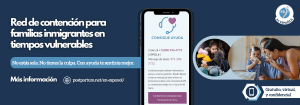By Erin O’Connor, EdD, Co-Founder of Nested, New York University Professor
Perinatal mood and anxiety disorders (PMADs) don’t only affect birthing parents. Non-birthing caregivers and grandparents play a vital, but often unsupported, role in family mental health.
Why We Need to Expand the Frame
For years, the conversation around perinatal mental health has focused almost exclusively on birthing parents. While this attention is necessary and overdue, it’s also incomplete. In our research at Nested, we consistently find that PMADs are not confined to one person. They affect the entire family system.
Non-birthing parents and grandparents are among the most critical supports during the perinatal period. But their mental health needs and their contributions are often invisible in both care settings and policy conversations. As a result, opportunities to reduce PMADs and strengthen families are being missed.
PMADs Affect Non-Birthing Parents, But We Rarely Screen Them
One of the most striking findings from our national survey is just how rarely non-birthing caregivers, including fathers, partners, and adoptive caregivers, are screened for their mental health. According to our data, only 2% of non-birthing caregivers were ever screened, yet research shows that up to 1 in 10 fathers experience postpartum depression.
As one mother in our study shared:
“I would bet all the money in the world that he had postpartum anxiety, and nobody told him that he was at risk for developing it. Nobody ever expressed to him that fathers get it, too. Nobody ever even did a screening on him.”
Despite robust evidence of hormonal, neurological, and emotional shifts in non-birthing parents, many care providers do not offer even basic screening or education. This absence can have long-term consequences, not only for the individual caregiver but for the partner relationship, the parent-child bond, and the overall functioning of the household.
The Ripple Effect of Untreated PMADs
Caregivers are more likely to experience PMADs when their partner is also struggling with mental health and serves as their primary source of emotional support, according to our findings. Families operate as interconnected systems where the well-being of one member directly affects others. When one caregiver develops PMADs, the emotional and logistical toll often ripples outward, impacting not only the other parent but also the infant and any older siblings.
Our research also found that only 24% of caregivers felt completely comfortable talking with their partner about their mental health challenges. For families relying on one another as their sole emotional lifeline, untreated PMADs can create a closed circuit of stress, isolation, and burnout. Addressing the mental health of both caregivers, early and comprehensively, is essential to preventing these ripple effects from taking root.
Grandparents: An Untapped Source of Support
While non-birthing parents are often left out of the conversation, grandparents are rarely part of it at all.
And yet, our research shows their involvement can be a powerful protective factor against PMADs. We found that among birthing parents, only 4 out of 10 with a supportive parent reported experiencing a PMAD, compared to 6 out of 10 among those who did not report having a supportive parent.
But access to that support is not guaranteed. Sixty-three percent of the parents we surveyed said they wanted more help from their parents, but work schedules and distance made it difficult.
“My mom helped so much during those first few days, but she lives 5 hours away and works, and could only get a few days off. It would have been so helpful to have her stay longer to help out with the newborn, but also my 4-year-old.”
Why It’s Time for Grandparent Leave
The solution isn’t only individual. It’s structural. Grandparents can offer meaningful, consistent support during a high-risk period for PMADs. But in many cases, they simply can’t afford the time off. This is why we’re calling for a national conversation about grandparent leave.
Some companies in the U.S., such as Booking.com and SentinelOne, have begun to introduce “grandternity” leave, allowing grandparents to take time off to support their children and grandchildren. In Sweden, parental leave policies allow up to 480 days to be shared between caregivers, with some eligibility for transfer to grandparents.
These policies don’t just benefit families. They improve retention, delay early retirement, and recognize caregiving as a valuable contribution to public health.
What We’re Missing & What We Could Build
Too often, our systems treat parenting as a solo endeavor, with one parent, typically the birthing parent, at the center of a narrow care plan. But what families actually need is layered support: from partners, grandparents, chosen family, and community.
That’s why we believe our approach to perinatal mental health must evolve. We need:
- Routine PMAD screening for non-birthing parents
- Expanded leave policies that include grandparents and other caregivers
- Public education campaigns that reflect the realities of modern family life
As one mother told us, reflecting on her partner’s struggle with undiagnosed postpartum anxiety:
“It would have made such a big difference for us if it were public knowledge that dads can be impacted, too.”
Centering the Whole Family
Supporting perinatal mental health means supporting the whole family, not just the person who gives birth. When we include non-birthing parents and grandparents in our care models, policies, and public messaging, we reduce isolation, increase resilience, and create the conditions for healthier beginnings.
The science is there. The stories are there. Now it’s time for our systems to catch up.
Perinatal Mental Health: Signs, Symptoms, and Treatment
Resources for Families
Get Help










